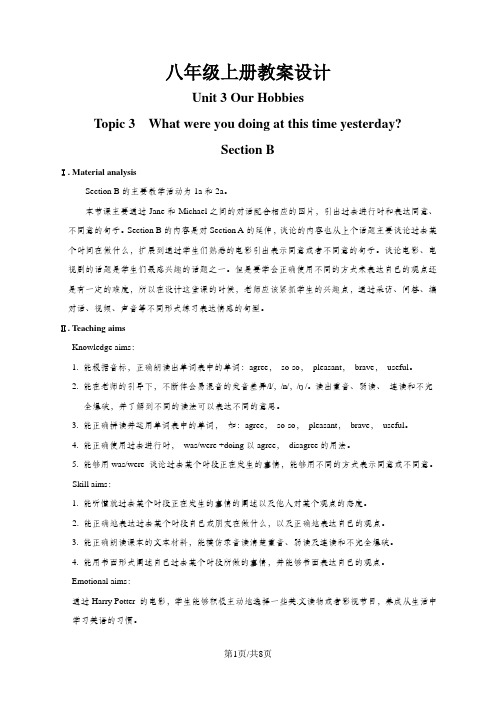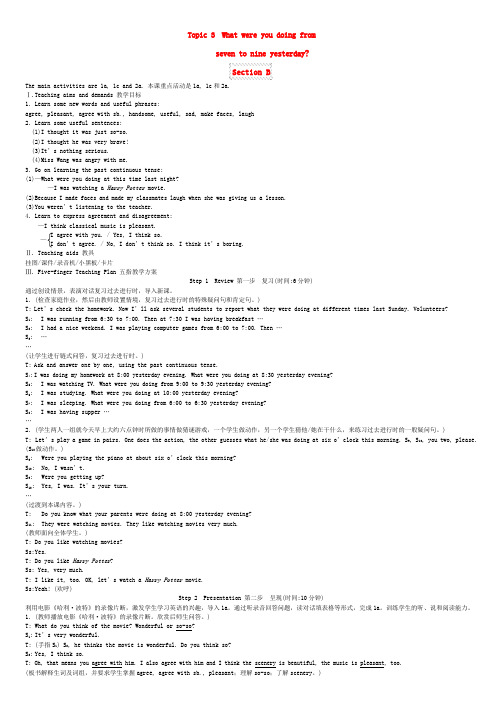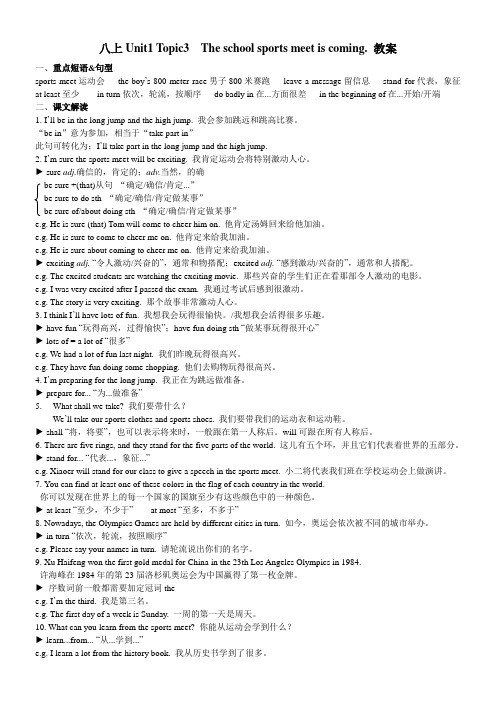仁爱版八年级上册Unit 1 Topic3 Section B教案教学反思教学设计
- 格式:docx
- 大小:12.98 KB
- 文档页数:2

八年级上册教案设计Unit 3 Our HobbiesTopic 3 What were you doing at this time yesterday?Section BⅠ. Material analysisSection B的主要教学活动为1a和2a。
本节课主要通过Jane和Michael之间的对话配合相应的图片,引出过去进行时和表达同意、不同意的句子。
Section B的内容是对Section A的延伸,谈论的内容也从上个话题主要谈论过去某个时间在做什么,扩展到通过学生们熟悉的电影引出表示同意或者不同意的句子。
谈论电影、电视剧的话题是学生们最感兴趣的话题之一。
但是要学会正确使用不同的方式来表达自己的观点还是有一定的难度,所以在设计这堂课的时候,老师应该紧抓学生的兴趣点,通过采访、问答、编对话、视频、声音等不同形式练习表达情感的句型。
Ⅱ. Teaching aimsKnowledge aims:1. 能根据音标,正确朗读出单词表中的单词:agree,so-so,pleasant,brave,useful。
2. 能在老师的引导下,不断体会易混音的发音差异/l/,/n/,/ /。
读出重音、弱读、连读和不完全爆破,并了解到不同的读法可以表达不同的意思。
3. 能正确拼读并运用单词表中的单词,如:agree,so-so,pleasant,brave,useful。
4. 能正确使用过去进行时,was/were +doing以agree,disagree的用法。
5. 能够用was/were 谈论过去某个时段正在发生的事情,能够用不同的方式表示同意或不同意。
Skill aims:1. 能听懂就过去某个时段正在发生的事情的阐述以及他人对某个观点的态度。
2. 能正确地表达过去某个时段自己或朋友在做什么,以及正确地表达自己的观点。
3. 能正确朗读课本的文本材料,能模仿录音读清楚重音、弱读及连读和不完全爆破。
4. 能用书面形式阐述自己过去某个时段所做的事情,并能够书面表达自己的观点。

Unit1 Topic3 SectionB 精品教案Ⅰ. Material analysisSection A and Section B 的内容整合,用三个课时上完。
本节课为单元第二课和第三课时,用两课时上完。
主要活动为Section B 的1a 和3a, 3b。
通过Kangkang 和Michael相约去参加运动会,呈现了本课所要学的语法重点Future Tense with shall。
相约中,依次呈现了:What shall we take? When shall we meet? Where shall we meet? 等功能性语言。
对话中呈现了重点短语:take sth …, make it half past six等。
本对话呈现了孩子们亲密无间的友情,旨在让学生在学会课本语言知识的同时,向Kangkang 和Michael学习,善于表达自己的感情,在参加集体活动中提升同学间的友情。
语音学习要求学生掌握两个辅音字母在一起第一个辅音字母的轻读现象;学生能正确认识元音在句中的弱读现象,并能正确朗读。
Ⅱ. Teaching aimsKnowledge aims:1. 能正确认识两个辅音字母在一起第一个辅音字母的轻读现象;学生能正确认识朗读元音在句中的弱读现象,并能正确朗读发音。
2. 能听懂含有以下短语的英语对话或文章:take sth. for…, make it half past six, catch up with, neck and neck, run into等。
3. 能正确地理解下列句子和短语,并能加以运用:What shall me take?When shall we meet?take sth …, make it+时间、地点或价钱。
4. 学生能正确理解并运用shall将来时,能运用shall进行写作。
Skill aims:1. 能听懂相约见面的对话,能听懂对运动场景描述的文字材料。

Topic 3 What were you doing fromseven to nine yesterday?Section BThe main activities are 1a, 1c and 2a. 本课重点活动是1a, 1c 和2a.Ⅰ.Teaching aims and demands 教学目标1. Learn some new words and useful phrases:agree, pleasant, agree with sb., handsome, useful, sad, make faces, laugh2. Learn some useful sentences:(1)I thought it was just so-so.(2)I thought he was very brave!(3)It ’s nothing serious.(4)Miss Wang was angry with me.3. Go on learning the past continuous tense:(1)—What were you doing at this time last night?—I was watching a Harry Potter movie.(2)Because I made faces and made my classmates laugh when she was giving us a lesson.(3)You weren ’t listening to the teacher.4. Learn to express agreement and disagreement:—I think classical music is pleasant.I agree with you. / Yes, I think so. I don ’t agree. / No, I don ’t think so. I think it ’s boring.Ⅱ. Teaching aids 教具挂图/课件/录音机/小黑板/卡片Ⅲ. Five-finger Teaching Plan 五指教学方案Step 1 Review 第一步 复习(时间:6分钟)通过创设情景,表演对话复习过去进行时,导入新课。

八上Unit1 Topic3 The school sports meet is coming. 教案一、重点短语&句型sports meet运动会the boy’s 800-meter race男子800米赛跑leave a message留信息stand for代表,象征at least至少in turn依次,轮流,按顺序do badly in在...方面很差in the beginning of在...开始/开端二、课文解读1.I’ll be in the long jump and the high jump. 我会参加跳远和跳高比赛。
“be in”意为参加,相当于“take part in”此句可转化为:I’ll take part in the long jump and the high jump.2.I’m sure the sports meet will be exciting. 我肯定运动会将特别激动人心。
► sure adj.确信的,肯定的;adv.当然,的确be sure +(that)从句“确定/确信/肯定...”be sure to do sth “确定/确信/肯定做某事”be sure of/about doing sth “确定/确信/肯定做某事”e.g. He is sure (that) Tom will come to cheer him on. 他肯定汤姆回来给他加油。
e.g. He is sure to come to cheer me on. 他肯定来给我加油。
e.g. He is sure about coming to cheer me on. 他肯定来给我加油。
► exciting adj.“令人激动/兴奋的”,通常和物搭配;excited adj.“感到激动/兴奋的”,通常和人搭配。
e.g. The excited students are watching the exciting movie. 那些兴奋的学生们正在看那部令人激动的电影。

《仁爱版》八年级英语(上)Unit 3 Our HobbiesTopic 1 What habbies did you use to have?Section B教案设计The main activities are 1a, 3a and 4.I. Teaching aims and demands:a. Knowledge objectives:(1) To enable my students to understand new words and phrases, “ share, e-mail address, VCD, pop music, in one’s spare time, comic”.(2) Learn the pattern of “used to”.(3) Go on talking about interests and hobbies not only now but also in the past and learn how to express likes and dislikes.b. Ability objectives(1) To devel op my students’ listening, reading and speaking strategies.(2) To develop the students’ vocabulary about hobbies and interests.(3) To enlarge the students’ sense of cooperation in their studies through activitiesc. Moral objectives(1) To guide my students into a better understanding that if you share, you will be happy.(2) To increase my students’ interest in learning English.(3) To strengthen their confidence in learning English.II. Teaching keys and difficulties1. To express their hobbies not only now, but also in the past.2. How to instruct Ss to share and cooperate with others.III. Teaching aidsboard, tape recorder, PPT, OHP, and some material objects, such as oranges, VCDs, comics and cards.IV. Teaching proceduresStep 1 Warm up and lead in1. Listen and sing a song called “Are you happy?” before the class.2. Greeting.3. Ask the Ss, “Are you happy if I share my orange?”And teach the new word-----share.eg:4. Using “share” to go on teaching the new words“e-mail address, VCD, spare, in one’s spare time, and comic.”eg:Step 2 Review1. Share hobbies with the Ss.a. Tell the Ss my hobbies, then encourage the Ss to tell me theirsb. While talking, use the brainstorming to review what hobbies we have learnt.eg:Step 3 (part 2) Look, listen and match1. Tell the Ss we have 8 more friends to share their hobbies with us, but we need to match their hobbies with the right English phrases.2. Let the Ss look and match3. Have the Ss listen to the tape recorder and number the sentences with the pictures.eg:Step 4 (1a) Look, listen and say.1. Listen and answer 2 questions.What does Wen Wei often do in his spare time?What’s Helen’s hobby?2. Let the Ss read the conversation in roles.First, the boys will be Wen Wei and the girls will be Helen.Then, change the boys’ and the girls’ roles.After that, ask two pairs to act it out.3. Pair workLet the Ss share hobbies like what Helen and Wen Wei do with their partners.First give them an example.Then give them 3 minutes to practise.After that, ask 2 or 3 pairs to show their dialogues.Step 5. (3a) Read and understand1. Use my own experience to lead in “used to”T: I used to dance, but now I don’t like it. I like reading comics.eg:2. Read 3a for the first time to fill in the blanks.He used to be a _______ fan, but now he is _________.He used to _______ , but now his hobbies are _______.He used to ________, but now he likes _________.Let the Ss compare “used to” and “now”3. Read 3a again and choose the right answersHe ____________a soccer fan.A. used to beB. didn’t use to beHe ____________ enjoy sports.A. used toB. didn’t use toHe ____________like collecting paintings.A. used toB. didn’t use toLet the Ss compare “used to” and “didn’t use to”Step 6 (part 4) Group work1. To give everyone a paper to do a survey.eg:2. Ask them to share hobbies with their classmates, and get their hobbies as many as they can.3. Make an example for the SsFirst ask them to write down their classmates’ or friends’ names.Then use the Q: Can you tell me your hobbies?Tell them that their answers can be one of these: Yes, I enjoy cooking now.I didn’t use to read comics, but now I like it.I used to dance, but now I hate it.4. If the Ss don’t understand, give one more example.5. Give the Ss about 5 minutes to do it.6. After that, ask some individuals to tell about his or her hobbies and his or her friends’ hobbies.Step 7 Summary1. Review the new words and the phrasesshare, e-mail address, VCD, pop music, in one’s spare time, comic2. Review the key sentences.What do you often do in your spare time?I often go fishing.I used to listen to music, but now I hate it.I didn’t use to play soccer, but now I like it.Step 8 Project and Homework1.Oral work:A. Read the dialogue and the passage 5 times to your friends.B. Make a conversation with your friend and act it to 2 of your classmates(Ask your friends to sign their names on your book after you finish your Oral Work)2. Written work:A. Make a brainstorming, you must write at least 10 hobbies.B: Write 3 sentences about hobbies.板书设计:Unit 3 Our HobbiesTopic 1 What hobbies did you use to have?Section BKey words Key Sentencesshare What do you often do in your spare time?e-mail address I often go fishing.VCDpop music I used to listen to music, but now I hate itsparecomic I didn’t use to play soccer, but now I like it.Reflecting (教学反思)本节课主要针对本班学生已具备的英语素质和对英语学习的热情而设计的,并且充分利用了现有的教育教学资源,以新课标精神为指导思想,努力改善学生学习的方式。

Section BThe main activities are 1a and 3. 本课重点活动是1a和3。
Ⅰ. T eaching aims and demands 教学目标1. Learn some new words:shall, pick, theater, stick, hit2. Go on learning the future tense with will:(1)We’ll take our sports clothes and sports shoes.(2)There will be another exciting relay race this afternoon.3. Learn about expressions on making appointments:(1)What shall we take?(2)Shall I take my camera?(3)When shall we meet?(4)Where shall we meet?Ⅱ. T eaching aids 教具教学挂图/小黑板/录音机/多媒体课件Ⅲ. Five-finger T eaching Plan 五指教学方案Step 1 Review 第一步复习(时间:10分钟)通过师生对话讨论运动会,导入本课生词和表达约定的功能用语。
1. (检查作业:汇报参加运动会的调查结果)T: Now we are all ready for the sports meet. Which sport will you take part in? Please report your survey to us.Ss: …2. (师生对话,引出shall句式,导入新课。
)T: There will be a sports meet in our school this afternoon. Will you go with me?S1: Y es, I’d be glad to.T: Y eah, let’s go together.yeah。
Unit1 Topic3 SectionC优质课教案1. The analysis of teaching material:The topic of this unit talks about the school sports meet and the Olympic Games, there are three topics in this unit: “I’m going to play basketball.”, “I’ll kick you the ball again.”, and “The school sports meet is coming.” In this class students will read a passage and finish three tasks. After reading the text and surfing more information on the internet. The students may know something about the modern Olympics.2. The analysis of students:The students are in Grade Eight. This topic is close to their daily life, most students have deep interest in sports, and they look forward to knowing more about the Olympics, so they are eager to learn more. They are active but their vocabulary is limited. They can remember less words and phrases; they hardly are able to write several sentences. What’s more, most boys in our class are afraid of learning English, they aren’t interested in English. Most students seldom preview the text before class, so I lead them to learn the knowledge by looking at the pictures, it will be easier for students to finish the tasks.3. The analysis of teaching goals:(1)To know something about the modern Olympics.(2)To read the passage, understand and complete the tasks.(3)To develop students’ ability of reading skills, individual reading and scanning.4. Key points and difficult points:(1)Key point: To read the passage, and complete the tasks.(2)Difficult point: To develop students’ ability of reading skills, individual reading and scanning.5. Teaching aids: multimedia, textbook, blackboard.6. Teaching methods: Task-Based Language Teaching,Five Steps Teaching.7. Teaching Procedures:Step1 Lead—inLet’s enjoy a song: Pass the flame.The teacher asks students: Do you like this song? And do you know what the song is about?Pass the flame is the theme song of the Olympic Games in Athens in 2004. Do you want to know more about the Olympics?Step2 Presentation (pre—reading)Teacher shows some pictures about the modern Olympics on the PPT, let students find out the years and the host cities. They should learn to say these sentences:The modern Olympics started in Athens, Greece in______.In 2000 ______ held the 27th Olympic Games.In 2004______ hosted the28th Olympic Games.______ hosted the 29th Olympic Games in 2008.London held the 30th Olympics in______.The 31st Olympics was held in ______ in2016.Then ask them to think about the two questions:Do you know when the next Olympics will be held?Which city will host the next Olympic Games?Activity 1: Match the years with the host cities of the Olympic Games.2000 Rio2004 London2008 Beijing2012 Athens2016 SydneyNext we will learn: the symbol of the Olympics and what do the five rings stand for? Olympic motto is: Faster, Higher, Stronger!Step3 Practice (while—reading)Task 1: Read the passage 1a and choose the correct answers.( ) 1. The modern Olympics started in______.A. 1952B. 1896C. 1996D. 2000( ) 2. What is the symbol of the Olympic Games?A. The Olympic emblems(会徽)B. The Olympic mascots (吉祥物)C. The Olympic ringsD. The flag of each country( ) 3. What do the five rings stand for?A. Five parts of the worldB. Five countriesC. Five citiesD. Five colors( ) 4. The Olympic Games are held every ______ years.A. 2B. 3C. 4D. 5( ) 5. Which of the following is TRUE?A. You can find one color in the flag of each country.B. The players from all over the world meet to compete and they can’t be friends.C. Only in Athens the Olympic motto is “Faster, Higher, and Stronger.”D. The Olympic Games will be more and more popular and exciting.While students doing this part, the teacher writes down the key words and phrase on the black board, after finishing the task, teacher retells the passage according to these tips.Task 2: Retell the passageThe modern Olympics started in Athens, Greece in ______. Its motto is “Faster, ______, Stronger”. The Olympic rings are a ______ of the Olympic Games. There are five rings, and they______ (代表)the five parts of the world. The ______ and Winter Olympics are held every four years. Nowadays, different cities hold the Olympics Games______(轮流). The Olympics are becoming______(越来越.......)popular and exciting.Step4 Summary: complete the notes (post—reading)1. The year of the first modern Olympics: __________________________________.2. The host city of the first modem Olympics:_________________________________.3. The motto of the Olympics Games:_______________________________________.4. The symbol of the Olympics Games:______________________________________.6. The colors of the rings:________________________________________________.7. The Summer Olympic Games are held every______ years.Step5 Homework1. Read this passage aloud.2. Finish part 2, 3 on page 228. Blackboard designTopic 3 The school sports meet is coming. (Section C)The modern OlympicsStarted in: 1896Stand for: the five parts of the worldBe held: every four yearsIn the future: more and more excitingThe Olympic motto: Faster, Higher, Stronger!9. Teaching reflectionIn this class, I think there are three successful points:(1) Listen to a song to attract students’ interest.(2) Lead students to learn more by reading other materials.(3) I integrate the textbook effectively that can make students understand easily. But there is also shortcoming, I pay less attention to individual students, focus on their learning results.I believe I will do better after my hard work.。
八年级上册教案设计Unit1PlayingSportsTopic3Theschoolsportsmeetiscoming.SectionAⅠ.Materialanalysis本节课的主要活动为1a和2b。
SectionA对话里,YuTing和LiMing兴奋地谈论即将到来的运动会,呈现了本课所要学的语法重点FutureTensewithwill。
YuTing和LiMing饶有兴趣地围绕Whichsportwillyoutakepartin?谈论着各自参加的运动会项目,呈现了重点短语:theboys’800-meterrace,beinthelongjump等。
本对话呈现了孩子们积极上进的学习生活,要求学生在学会课本语言知识的同时,向YuTing和LiMing学习,积极参与学校各项集体活动,在培养集体主义思想的同时,培养自己自信、上进的个人素质。
Ⅱ.TeachingaimsKnowledgeaims:1.能正确运用以下短语进行书面表达:theboys’800-meterrace,beinthelongjump,havelotsof fun,preparefor,makemanyfiends,makefriendswithsb.等。
2.能正确地理解下列句子和短语:Theschoolsportsmeetiscoming.thecomingschoolsportsmeet3.能正确理解并运用will将来时,能运用will进行造句。
Skillaims:1.能听懂有关运动会项目的名称及相关话题。
2.能熟练地运用will引导的将来时谈论有关运动会的话题。
3.能正确朗读介绍运动会项目的对话或文章。
4.能用will将来时介绍自己或朋友在运动会中参加的项目。
Emotionalaims:通过学习YuTing和LiMing积极上进的对话内容,鼓励学生要积极参与学校集体活动,培养自己乐观、自信、乐于合作的优良品质。
Ⅲ.ThekeypointsanddifficultpointsKeypoints:theboys’800-meterrace,beinthelongjump,havelotsoffun ,preparefor,makemanyfriends,makefriendswithsb.等短语的理解及运用。
仁爱版八年级上册英语课堂教学案例设计及教学反思《Unit 1 Topic1 Section D, 2 Written work》一、背景知识介绍。
书面表达是写的一种途径,是英语交际的重要组成部分。
初中阶段对于英语写作的要求,实际上是“有指导的写作“(Guided Writing)。
它通过提供情景(文字、图画、表格),让学生用学过的英语语言来描述事物或事件并表达一定的思想,以此达成和检验对所学英语语言知识的实践应用能力。
客观地说,书面表达一直是我们英语教学的一个难点,也是学生应试的一个难点。
从这几年对洛江区中考模拟英语试卷的抽样调查情况来看,英语写作是得分最为薄弱的一个题项。
究其原因,一是学生写作练习的时间少,二是教师平时缺乏对学生进行系统的写作知识的指导。
(比如,如何用词、句、组段、谋篇等)。
这些原因造成了学生从最初不会写盲目写到不愿写。
惧怕写,直至最后拒绝写的恶性循环。
针对这一现象,我在十一中进行了一次如何提高学生写作能力的课堂实践。
写作的材料取自于仁爱版英语八年级(上)“Unit 1 ,Topic 1,Section D ,3 Written work”。
教师旨在通过与学生谈论他们熟悉的话题“sports”,搜索学生头脑中有关运动的信息,通过阅读本话题,获取有关运动的一些信息,指导学生如何写My Favorite Sport ,从而达到写作的目的。
二、教学课时:1课时(45分钟):写四、教学目标:总结一般将来时:be going to + do sth.的用法;培养学生以提问的方式来写作的能力;谈论自己所喜欢的体育活动、体育明星及自己梦想的职业;培养学生热爱生活,热爱运动。
容:描述和谈论了一些体育运动项目,介绍了自己最喜欢的体育明星及自己梦想的职业。
点:培养学生一种写作能力---提问的方式来写作。
七、教学过程:Step 1.Warm-up活动:通过听一首英语歌:“The more we get together,the happier we’ll be.”【设计说明】目的是活跃气氛,为引出今天的话题做准备。
精心整理Unit1Topic3教案SectionAThemainactivitiesare1aand2a.本课重点活动是1a和2a。
Ⅰ.Teachingaimsanddemands教学目标1.Learnsomenewwordsandphrases:relayrace,excited,hear,havefun,lotsof,preparefor,makefriends2.Learnthefuturetensewith will:(1)Ithink I’llhavelotsoffun.(2)I’lldomybest.Iwon’tlose.(3)I’llmakemanyfriendsduringthesportsmeet.(4)I’lljoinintheteachers’relayrace.3.Talkaboutschoolsportsmeet:(1)Iwilltakepartintheschoolsportsmeet.(2)Whichsportwillyoutakepartin?(3)I’llbeinthelongjumpandthehighjump.(4)I’msureourschoolsportsmeetwillbeexciting.Ⅱ.Teachingaids教具录音机/幻灯片Ⅲ.Five-fingerTeachingPlan五指教学方案Step1Review第一步复习(时间:8分钟)复习上个话题的语法、句型及功能用语,引出本课生词、语法及话题,导入新课。
1.(让学生进行链式问答,复习上一话题的重要语法和功能用语。
)(师生谈话导入本课话题和生词。
)T:Doyouknowwhoismyfavoritesportsplayer?Ss: WethinkyourfavoritesportsplayerisMichaelJordan.T: Yes.IsheChinese?Ss: No,heisn’t.T:Wealllikesportsbecausewewanttokeephealthy.Ifthereisasportsmeetinourschool,I’lljoinintherelayr ace.IthinkIwillhavelotsoffun.Whichsportwillyoutakepartin?(引出词组:relayrace,havefun,lotsof;语法:Futuretensewith will;话题:Whichsportwillyoutakepartin?) (板书并要求学生掌握。
仁爱版八年级上册Unit 1 Topic3
Section B教案教学反思教学设计
仁爱版八年级上Topic 3Which sport will you take part in? Section B教学设计The main activities are1aand3a. 本课重点活动是1a和3a。
Ⅰ. Teaching aims and demands 教学目标 1. Learn some new words:
shall, pick, theater, stick, hit
2. Go on learning the future tense with will:
(1)We’ll take our sports clothes and sports shoes.
(2)There will be another exciting relay race this afternoon.
3. Learn about expressions on making appointments:
(1)What shall we take?
(2)Shall I take my camera?
(3)When shall we meet?
(4)Where shall we meet?
(5)Let’s make it half past six.
Ⅱ. Teaching aids 教具教学挂图/小黑板/录音机/多媒体课件
Ⅲ. Five-finger Teaching Plan 五指教学方案Step
1Review 第一步复习(时间:10分钟)通过师生对话讨论运动会,导入本课生词和表达约定的功能用语。
1. (检查作业:汇报参加运动会的调查结果)
T:Now we are all ready for the sports meet. Which sport will you take part in? Please report your survey to us.
Ss: …
2. (师生对话,引出shall句式,导入新课。
)
T:There will be a sports meet in our school this afternoon. Will you go with me?
S1: Yes, I’d be glad to.
T:Yeah, let’s go together.
(板书并提醒学生注意这一句型。
了解生词yeah。
)
There will be …, yeah。